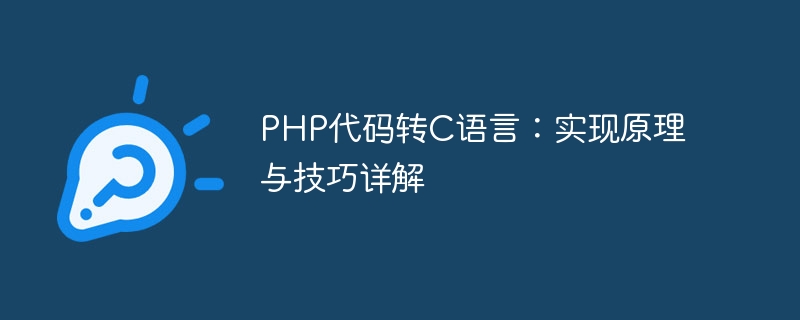Home >Backend Development >PHP Tutorial >Convert PHP code to C language: detailed explanation of implementation principles and techniques
Convert PHP code to C language: detailed explanation of implementation principles and techniques
- WBOYWBOYWBOYWBOYWBOYWBOYWBOYWBOYWBOYWBOYWBOYWBOYWBOriginal
- 2024-03-13 09:27:041076browse

PHP and C language are two commonly used programming languages. They have their own advantages and characteristics in different fields. PHP is a scripting language commonly used for web development, while C is a compiled language commonly used for systems programming and embedded development. In some specific cases, we may need to convert PHP code to C language to improve performance or enable interaction with the underlying system.
Why it is necessary to convert PHP code to C language
In some high-performance application scenarios, PHP code may not meet the needs because PHP is an interpreted language and its performance is relatively low. The C language is a compiled language, which has faster execution speed and can better utilize system resources. Therefore, converting PHP code to C language can improve the execution efficiency and performance of the program.
In addition, some specific tasks require interaction with the underlying system, and C language can more conveniently perform system-level programming and directly interact with the hardware. By converting PHP code into C language, more complex and low-level functions can be implemented.
The implementation principle of converting PHP code to C language
The essence of converting PHP code to C language is to convert PHP syntax and functions into the syntax and functions of C language. In terms of implementation, static analysis and code generation can be used. Specifically, PHP code can be parsed through a lexical analyzer and a syntax analyzer, and then the corresponding C language code can be generated based on the parsed syntax tree.
Tips for converting PHP code to C language
- Choose appropriate tools: There are some tools that can be used to convert PHP code to C language, such as Phalanger, HHVM, etc. Choosing the right tool can improve the efficiency and accuracy of your conversion.
- Handling PHP-specific syntax and functions: PHP and C language have some different syntax and functions, and these differences need to be handled during the conversion process. For example, the dynamic typing and weak typing features in PHP are not supported in C language and require corresponding conversion and processing.
- Optimize the generated C code: The generated C code may have some redundant or unnecessary parts that need to be optimized. The generated C code can be optimized through code refactoring and improved algorithms to improve performance and maintainability.
Code Example
The following is a simple PHP code example, converted to C language code:
<?php
function hello_world() {
echo "Hello, World!";
}
hello_world();
?>
转换为:
#include <stdio.h>
void hello_world() {
printf("Hello, World!");
}
int main() {
hello_world();
return 0;
}Summary
In In some specific cases, converting PHP code to C language can improve the performance and efficiency of the program, while achieving more complex and low-level functions. With the right tools and techniques, we can convert PHP code to C language and optimize the generated C code to make it more efficient and maintainable. I hope this article will be helpful to the implementation principles and techniques of converting PHP code to C language.
The above is the detailed content of Convert PHP code to C language: detailed explanation of implementation principles and techniques. For more information, please follow other related articles on the PHP Chinese website!

